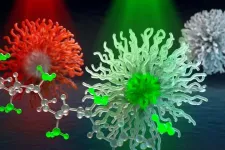(Press-News.org) Two articles published online today by Alzheimer's & Dementia: Translational Research & Clinical Interventions, a journal of the Alzheimer's Association, show substantial changes in the focus and funding of clinical trials for Alzheimer's disease therapies. The newly published articles throw a greater spotlight on a decision -- now before the U.S. Food and Drug Administration (FDA) -- that would potentially bring a new drug therapy to Alzheimer's patients for the first time in nearly 20 years.
Researchers analyzed clinicaltrials.gov, the U.S. National Library of Medicine's database, and five years of annual Alzheimer's pipeline reviews published by UNLV School of Integrated Health Sciences research professor Jeffrey L. Cummings and colleagues. The results capture the well-publicized retreat of pharma from Alzheimer's clinical trials, especially early phase human trials, and the emergence of federal agencies and nonprofit organizations as the primary drivers of growth and innovation.
In the first study, "Who Funds Alzheimer's Disease Drug Development?," Cummings and colleagues found that the number of Alzheimer's clinical trials supported by pharmaceutical companies has decreased over the past five years, while trials supported by federal government sources and public-private partnerships (PPP) have increased. The authors observe that pharma companies are not increasing their involvement in Alzheimer's trials and drug development except through PPP, enabling them to distribute the cost and risk. And they largely engage only in late-stage (Phase 3) clinical trials.
The researchers found that the trials gap is increasingly being filled by academic medical centers (AMCs). Trials by AMCs are up 78% over the past five years, primarily funded by the U.S. National Institutes of Health (NIH) and programs of the National Institute on Aging (NIA), Alzheimer's Association, and Alzheimer's Drug Discovery Foundation (ADDF), including the Alzheimer's Association's Part The Cloud initiative.
"Nonprofits and the NIH are making a huge difference in drug development for Alzheimer's and all other dementia," Cummings said. "Recent years have been a time of pharma retrenchment after multiple negative clinical trials, but also a time of innovation in early-stage trials and re-evaluation of previously under-resourced ideas. We found in our review that, in the newer early-stage clinical trials, the therapeutic mechanisms are more diversified, biomarkers are more regularly used, and repurposed agents are being explored -- increasingly led by academic researchers and funded by NIH, the Alzheimer's Association, and ADDF.
A second paper, "Alzheimer's Disease Drug Development Pipeline: 2021," also by Cummings and colleagues, including a student, Justin Bauzon, from the UNLV School of Medicine, reinforces these trends by showing that, despite pharma's retreat from Alzheimer's, the total number of agents in Alzheimer's clinical trials has been relatively steady over the last five years. The total is up slightly from 2020, driven by additional agents in Phase 2 studies. There is also increasing diversity of targets and therapeutic mechanisms of drugs in the Alzheimer's pipeline, driven by innovative Phase 1 and 2 trials.
"Alzheimer's Association funding, partnerships - including the NIA and ADDF - and advocacy for federal Alzheimer's research funding are now the primary drivers of growth in Alzheimer's clinical trials, filling the gap left by pharma's retreat, and growing and diversifying the front end of the drug pipeline," said Maria C. Carrillo, Alzheimer's Association chief science officer.
The NIA now distributes more than $3 billion annually for Alzheimer's and dementia research, up from $500 million just a few years ago. "This great victory is almost completely due to Alzheimer's Association legislative efforts, our grassroots advocates, and our champions in Congress," Carrillo said.
The FDA is reviewing aducanumab (Biogen) for the treatment of Alzheimer's disease. A decision is expected by June 7.
"If pharma companies do not see a clear path to FDA approval, they will continue not to invest in Alzheimer's," Cummings said. "This further highlights the importance of the decision before the FDA at this moment."
There are four drugs approved and commonly used to treat the symptoms of Alzheimer's dementia, plus a combination therapy that includes two of these drugs. There are currently no approved drugs that change the course or delay the progression of the disease or that delay or stop clinical decline. No new drugs have been approved for Alzheimer's since 2003.
The article authors say, "If new therapies are approved by regulatory authorities, more sponsors and more funding may be attracted to Alzheimer's research with accelerated innovation."
The two studies were supported by the Chambers-Grundy Center for Transformative Neuroscience at UNLV, dedicated to advancing clinical trial methods to get better treatments to patients faster.
INFORMATION:
UNLV Department of Brain Health
The UNLV Department of Brain Health was launched by the School of Integrated Health Sciences (SIHS) in 2019 to advance research, education, and practice to benefit brain health and the care and treatment of people with brain disorders. The department's faculty specialize in basic and clinical research in neurodegenerative disease, neuropsychology, and occupational therapy.
Alzheimer's & Dementia: Translational Research & Clinical Interventions (TRCI)
Alzheimer's & Dementia: TRCI is a peer-reviewed, open-access journal from the Alzheimer's Association that bridges the full scope of explorations between basic research, drug discovery, and clinical studies in Alzheimer's and dementia. The journal publishes findings from multifaceted domains of research and disciplines to accelerate what is learned at the bench and translated and applied at the bedside.
Researchers at the Vienna BioCenter designed a testing protocol for SARS-CoV-2 that can process tens of thousands of samples in less than 48 hours. The method, called SARSeq, is published in the journal Nature Communications and could be adapted to many more pathogens.
The COVID-19 pandemic has lasted more than a year and continues to impact our lives tremendously. Although some countries have launched speedy vaccination campaigns, many still await large-scale immunization schemes and effective antiviral therapies - before that happens, the world urgently needs to regain a semblance ...
While we sleep, the brain produces particular activation patterns. When two of these patterns - slow oscillations and sleep spindles - gear into each other, previous experiences are reactivated. The stronger the reactivation, the clearer will be our recall of past events, a new study reveals.
Scientists have long known that slow oscillations (SOs) and sleep spindles - sudden half-second to two-second bursts of oscillatory brain activity - play an important role in the formation and retention of new memories.
But experts in the UK and Germany have discovered that the precise combination of SOs and sleep spindles is vital for opening windows during which ...
As devices continue to be built on an increasingly small scale, scientists are looking toward developing ways to engineer materials at the atomic level. In a breakthrough that will contribute to this, published in Nature Communications, researchers from the RIKEN Cluster for Pioneering Research and RIKEN Center for Advanced Photonics, along with collaborators, have developed a way to use a "dry transfer technique"--a technique that uses no solvent--to position optical quality carbon nanotubes in a precise way.
Carbon nanotubes are a promising type of materials with potential uses in applications such as light-emitting diodes, ...
HOUSTON - (May 25, 2021) - Sometimes things are a little out of whack, and it turns out to be exactly what you need.
That was the case when orthoferrite crystals turned up at a Rice University laboratory slightly misaligned. Those crystals inadvertently became the basis of a discovery that should resonate with researchers studying spintronics-based quantum technology.
Rice physicist Junichiro Kono, alumnus Takuma Makihara and their collaborators found an orthoferrite material, in this case yttrium iron oxide, placed in a high magnetic field showed uniquely tunable, ultrastrong interactions between magnons in the crystal.
Orthoferrites ...
PULLMAN, Wash. - Before the huge potential of tiny nanocarriers for highly targeted drug delivery and environmental clean-up can be realized, scientists first need to be able to see them.
Currently researchers have to rely on attaching fluorescent dyes or heavy metals to label parts of organic nanocarrier structures for investigation, often changing them in the process. A new technique using chemically-sensitive "soft" X-rays offers a simpler, non-disruptive way of gaining insight into this nano-world.
In a study published by Nature Communications, a research team demonstrates the capability of the X-ray method on a smart drug delivery nanoparticle and a polysoap nanostructure intended to capture crude oil spilled in the ocean.
"We have developed a ...
Ancient Judeans commonly ate non-kosher fish surrounding the time that such food was prohibited in the Bible, suggests a study published in the peer-reviewed journal Tel Aviv.
This finding sheds new light on the origin of Old Testament dietary laws that are still observed by many Jews today. Among these rules is a ban on eating any species of fish which lacks scales or fins.
The study reports an analysis of ancient fish bones from 30 archaeological sites in Israel and Sinai which date to the more than 2,000-year span from the Late Bronze Age (1550-1130 ...
Emergency department visits for common conditions such as appendicitis, miscarriage, gallbladder attacks and ectopic pregnancy decreased markedly at the start of the COVID-19 pandemic, but patient outcomes were not worse, found research published in CMAJ (Canadian Medical Association Journal) https://www.cmaj.ca/lookup/doi/10.1503/cmaj.202821.
"These findings are reassuring, as patients who required emergency care in the first wave of the pandemic continued to present to the emergency department, received similar care and had similar outcomes to patients presenting in the prepandemic period," writes Dr. David Gomez, a trauma surgeon at St. Michael's Hospital, Unity ...
Summary: A new study published by the open access publisher Frontiers shows the usefulness of opportunistically collected specimens, such as stranded carcasses, to study elusive species. The researchers used stable isotope analysis of skin, muscle, and bone tissue of Sowerby's beaked whales to study their spatial ecology. They found that the species exhibits both short- and long-term habitat fidelity. The results are published in Frontiers in Conservation Science and show the importance of such studies for marine wildlife conservation.
A mysterious whale species
Beaked whales, a species of toothed whales, make up more than 25% of extant cetaceans (dolphins, porpoises, and whales), but are elusive and notoriously difficult to study. They live in deep waters and stay away ...
In a study funded by National Institute for Health Research (NIHR) Maudsley Biomedical Research Centre (BRC) researchers examined whether depression, either before or during pregnancy, affects the mother-infant relationship. The research was published today (Tuesday 25 May) in BJPsych Open.
Researchers looked at the quality of mother-infant interactions eight weeks and 12 months after birth in three groups of women; healthy women, women with clinically-significant depression in pregnancy, and women with a lifetime history of depression but healthy pregnancies.
The study used a sample of 131 women: 51 healthy mothers with no current or past depression, 52 mothers with depression referred to the South London and Maudsley ...
A team of UBC Okanagan researchers is looking at strategies that could help the homeless during a pandemic.
John Graham, director of UBC Okanagan's School of Social Work, says while many populations have been targeted with guidelines to keep them safe, homeless people have been mostly overlooked.
While this research project began a few years ago, Graham says his team quickly turned their attention to the impact of COVID-19. His team looked at peer-reviewed publications, dating back to 1984, that examined how homeless populations were impacted by other highly contagious or communicable illnesses such as tuberculous, H1NI and Severe Acute Respiratory Syndrome ...


